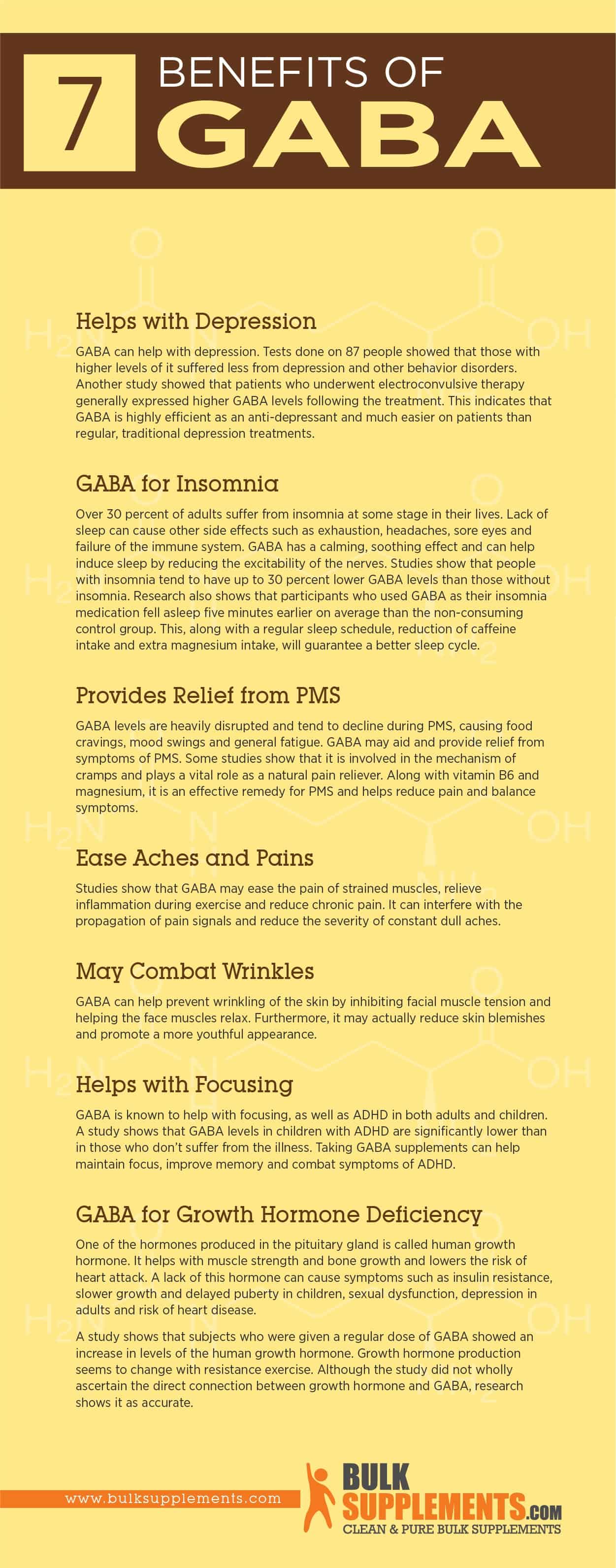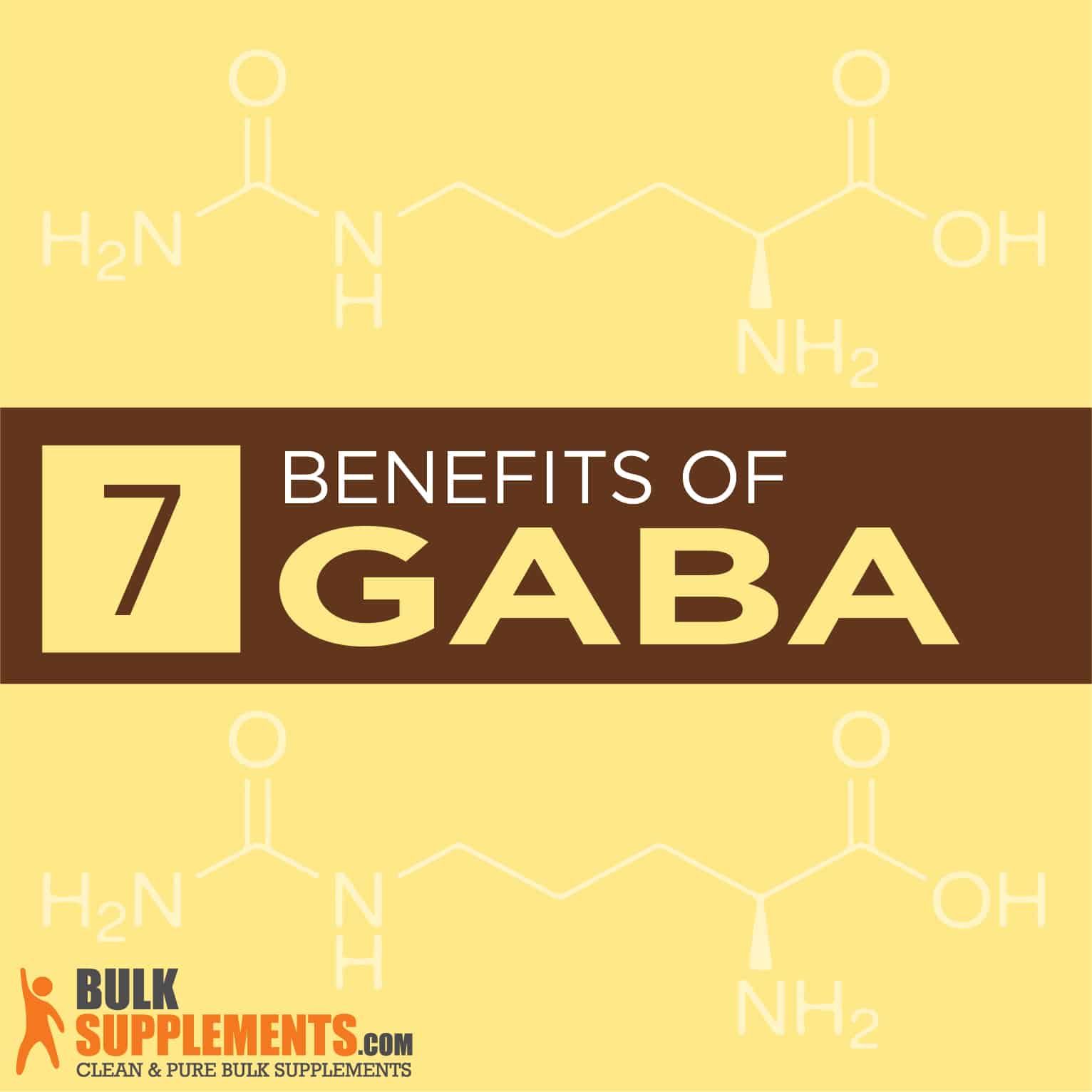Gamma-aminobutyric acid, termed GABA for short, is a naturally occurring amino acid in the body that also works as a neurotransmitter in the brain. In fact, it is the primary neurotransmitter in a fully developed adult mammalian brain. One of its main functions is reducing neuronal excitability in the central nervous system. Another one of its primary functions is communicating between brain cells. GABA supplements may be able to mimic the same properties.
GABA is produced by glutamate in the brain. There are several studies, however, that suggest that GABA isn’t only found in the brain, but also in the stomach, intestines, testes, ovaries, kidneys, liver, bladder and lungs—but at much lower levels than in the brain. It also helps build muscles.
Researchers have studied its medicinal benefits for years. Studies suggest that many people use its supplemental form to help with stress relief. If you’ve been considering adding GABA supplements to your everyday diet, learn more about its health benefits and how it may be able to help you individually.
What are Neurotransmitters?
Neurotransmitters act as chemical messengers that allow neurons to communicate with each other. They enable the brain to conduct a number of functions using a process called chemical synaptic transmission (x). They transmit messages between neurons and from the neurons to the muscles, sending off signals for the body to perform everyday functions, especially as it relates to movement and exercise.
There are several different types of neurotransmitters in the body (x):
- Excitatory neurotransmitters, which promote electrical signals
- Inhibitory neurotransmitters, which prevent electrical signals
- Neuromodulators, which effect large numbers of neurons at once and regulate neuron populations
GABA has both inhibitory and excitatory effects. Studies suggest that GABA inhibits adult neurons, but excites immature ones because they have a higher intracellular chloride concentration (x).
What is GABA?
GABA acts as an amino acid and it is a major neurotransmitter in the central nervous system. It functions to reduce neuronal excitability by preventing nerve transmission (x). Its main excitatory transmitter is glutamate and it counterbalances glutamate’s stimulatory actions (x). Together, they work to create balance in the body. GABA balances inhibitory neuronal transmission while glutamate balances excitatory neuronal transmission, which is essential for neurological function and the stability of the cell membrane (x). GABA’s primary purpose in the body is to reduce nerve excitability, which aims to alleviate stress and regulate blood pressure.
GABA was originally discovered by Eugene Roberts, who was the first to report that GABA is an amino acid compound in the brain (x). But before his discovery just over 50 years ago, the medical community knew little about GABA. Today, researchers recognize it as a vital transmitter that the brain needs to maintain the body.
What Does GABA Do in the Body?
Imagine a corporate company and its executive team. There’s a president, who gives orders to the “middlemen” and then they relay those messages to the rest of the team. GABA acts as the “middleman” messenger in this scenario. It sends chemical messages throughout the brain and the central nervous system and helps regulate the communication from one brain cell to another.
GABA stabilizes mental and physical health, providing a balance so that the body can perform its overall daily functions. It maintains this balance by working with glutamate, which is an excitatory neurotransmitter. However, before adding GABA to your diet, make sure to consult a doctor to make sure the supplement is the right one for you. Why take GABA? What are the neurotransmitter’s natural roles in your body?
Regulating Blood Pressure
Studies suggest that GABA can naturally reduce blood pressure and slow down individual heart rate (x). Additionally, research suggests that it may help with hypertension, which is a chronic disease that can cause serious complications such as a stroke or heart attack. Since GABA is an inhibitory neurotransmitter, its natural role is to calm the nerves. In studies, the supplement may be able to activate GABA receptors and inhibit norepinephrine—an excitatory neurotransmitter—to stabilize blood pressure (x, x).
Promoting Healthy Sleep
GABA has soothing effects that naturally help encourage sleep due to its inhibitory properties (x). Studies show that over 20% of adults suffer from insomnia at some point in their lives, (x) which sometimes causes daunting side effects, such as headaches, sore eyes and fatigue. Research states that patients who suffer from insomnia may have up to 30% less GABA than people who do not suffer from insomnia (x).
Have you suffered from insomnia lately? Are you in desperate need of a healthy alternative to help you out? GABA in its supplement form may be the right solution for you, if a physician approves. Taking the supplement and making other lifestyle changes like reducing caffeine intake may help provide a healthier, more regular sleep cycle (x).
Managing Stress & Anxiety
While GABA isn’t the only neurotransmitter responsible for regulating stress and anxiety, it does play an important role. Studies claim that GABA’s ability to inhibit neuron activity causes a state of relaxation (x). It has the natural ability to modulate anxiety responses in the brain, specifically the amygdala. According to research, GABA neurotransmission may help regulate anxiety-related responses and behaviors, such as fear. If this is true, there may be a positive association between GABA neurotransmission and anxiety disorders (x).
Regulating Mood & Depression
In addition, according to research GABA may also help with symptoms of depression. In a study using more than 80 participants, those with higher levels of GABA in the body may have suffered less from depression and other mood disorders (x). Because GABA works with glutamate to maintain balance, research also suggests that depression may be the result of a GABA deficit that throws the relationship off balance.
The brain releases glutamate to relay excitatory information in response to certain triggers and when it is done, GABA interferes to reduce excitability. But without enough GABA, the body may make even more glutamate to make up for it but the brain does not regulate the process properly, potentially leading to depression and anxiety, like we mentioned before. But it may also increase the risk for other disorders, such as schizophrenia or autism (x).

How to Increase GABA
There are a number of ways to increase GABA that don’t involve taking the supplement. They may be present in the food you can eat every day. Research states that it is present in plants and animals. They are also present in food fermented by microorganisms, specifically lactic acid bacteria. These foods include (x):
- Yogurt
- Cheese
- Sourdough
- Paocai
- Kimchi
But if you find that you still need a source for GABA, consider taking it as a supplement. GABA supplements may help improve your mental health, mood and sleep, which can contribute to overall health and wellness.
Dosage
As a supplement, the recommended dosage for GABA in powder form is 750 mg once or twice daily on an empty stomach, or as directed by a physician. If you are taking GABA in capsule form, you should take one capsule one to three times a day, after consulting a physician.
Warnings & Possible Side Effects of GABA Supplements
If you take recommended dosage for short periods of time—up to 12 weeks—GABA is safe to consume orally with fairly few side effects. However, there is a possibility that a patient may experience unwanted side effects, interactions with other substances or complications for certain health conditions. To avoid these effects, consult a doctor before adding any supplement to your daily health routine to make sure it’s the right option for you.
Pregnancy
Patients who are pregnant or breastfeeding should avoid taking GABA as a dietary supplement, as there is little definitive research on its safety. According to some studies, fetal exposure to GABA may cause neuronal migration disorders (x). It may be best to stay on the safe side and avoid it.
Drug & Alcohol Use
You should not take GABA as a supplement under the influence of alcohol. GABA and alcohol have the same relaxing effects on the body and may cause extreme complications. Excessive alcohol use while taking GABA may damage GABA receptors and cause additional stress or anxiety (x, x).
Low Blood Pressure
Research claims that GABA may reduce high blood pressure, but it may also interfere with medications that aim to do so. This combination may cause the blood pressure to drop too low and cause complications. Consult a doctor to avoid any unwanted interactions (x).
Where to Buy GABA Supplements
You can purchase GABA supplements in powder and capsule form at BulkSupplements.com. The company is an industry-leading manufacturer and distributor for pure dietary supplements. BulkSupplements.com is not just a consumer brand. It also supplies pure ingredients to other brands that distribute other food and supplement products. All products at BulkSupplements.com are manufactured and tested according to current and proper manufacturing practices.
Are you interested in trying GABA as a dietary supplement to possibly improve mood and sleep so that you can feel your best? Contact BulkSupplements.com to place an order.
Bottom Line
GABA is a neurotransmitter responsible for sending chemicals from the brain to the rest of the body. It is an inhibitory neurotransmitter, meaning it reduces activity in the brain, working with glutamate, which is an excitatory neurotransmitter. According to research, GABA may play a role in regulating blood pressure, mood and sleep thanks to its inhibitory properties.
GABA is likely safe to take orally in short periods of time. However, taking incorrect doses may cause unwanted side effects. Although GABA is a natural chemical in the brain, there is no scientific research to completely support its effects as a dietary supplement. Consult a doctor before taking the supplement to make sure it’s the right dietary alternative for you.
**These statements have not been evaluated by the Food and Drug Administration. These products are not intended to diagnose, treat, cure or prevent any disease.


